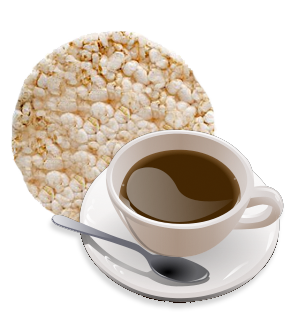Identifying and Distinguishing
between Similes and Metaphors

Source: Coffee Cup and Rice Cake, Julius Schorzman, Wikimedia Commons
A simile is an analogy that directly compares two seemingly unlike things through a connective word (“like,” “as,” “than,” or a verb such as “seems” or “resembles”). Humorists might use similes to amuse.
The columnist Dave Barry says, “Eating rice cakes is like chewing on a foam coffee cup, only less filling.” In comparing the flavor of supposedly healthy rice cakes to an inedible foam coffee cup, he hopes to make us smile in agreement with his dislike of a low-calorie, good-for-you, but tasteless, snack.
Listen to the audio files below, which feature similes from “Figures in Sound” on the American Rhetoric Web site. You will hear examples from people as diverse as William Jennings Bryan and Morgan Freeman. When you’re finished listening to the audio file, do the exercise that follows.
“ A Republic whose history, like the path of the just, is as the shining light that shineth more and more unto the perfect day. ”
“I’ve had some long nights in the stir. Alone in the dark with nothing but your thoughts, time can draw out like a blade. That was the longest night of my life.”
Kramer: “We have to put the board in a neutral place where no one will tamper with it.”
Seinfeld: “So that's here?”
Kramer: “Yes, yes, you’re like Switzerland.”
Seinfeld: “I don’t wanna be Switzerland.”
“But his strong love stands like a granite rock unmoved by the hurricanes of our inequity.”
“People in the streets see it now. They’re running towards the East River -- thousands of them dropping in like rats. Now the smoke’s spreading faster. It’s reached Times Square. People are trying to run away from it, but it’s no use. They’re falling like flies.”
“It is a curious thing, the death of a loved one. It’s like walking up the stairs to your bedroom in the dark and thinking that there's one more stair than there is. Your foot falls down through the air, and there's a sickly moment of dark surprise.”
Now sort these terms into their proper boxes in the chart. In some cases, the term you will sort is the literal portion of the simile. In other cases, it will be the figurative part. Dave Barry’s simile has been completed for you as an example.
A metaphor, like a simile, is a type of comparison that may be as short as a single word, a phrase, or a clause, or as long as an entire literary piece. Metaphors, however, do not use “like” or “as.” Metaphors marry figurative terms to literal terms. For example, in The Long Goodbye Raymond Chandler writes, “He was eager to help but his legs were rubber. . . .” Chandler has given one thing (rubber) a name that belongs to something else (a character's legs).
Listen to the audio files below, which feature metaphors from “Figures in Sound” on the American Rhetoric Web site. Again, the examples are in the voices of a variety of speakers. When you've listened to all of them, do the exercise that follows.
Colonel Kurtz: “Are you an assassin?”
Captain Willard: “I’m a soldier.”
Colonel Kurtz: “You’re neither. You’re an errand boy . . . sent by grocery clerks . . . to collect a bill.”
“Why this country is a shining city on a hill.”
“With this faith, we will be able to transform the jangling discords of our nation into a beautiful symphony of brotherhood.”
“This is, of course, the big event of show business, and the atmosphere here is pure electricity. But as a television show, it does tend to go slightly off the boil, particularly as we drift into the third and fourth hour. What can we do about it?”
“At the dawn of spring last year, a single act of terror brought forth the long, cold winter in our hearts. The people of Oklahoma City are mourning still.”
Now sort these terms in their proper boxes in the chart. In some cases, the term you will sort is the literal portion of the simile. In other cases, it will be the figurative part.
Hint: You will not use all of the items shown.
The metaphors from the American Rhetoric Web site might be called "A=B" comparisons in which a literal term (“a soldier”) is equated with a figurative term (“errand boy”). A second type of metaphor (often a single word) implies or suggests a comparison. This second type may take the form of a verb, noun, or adjective.
Verb: The lawyer grilled the witness on the stand.
Adjective: They rode . . . toward the evening lands. (Cormac McCarthy)